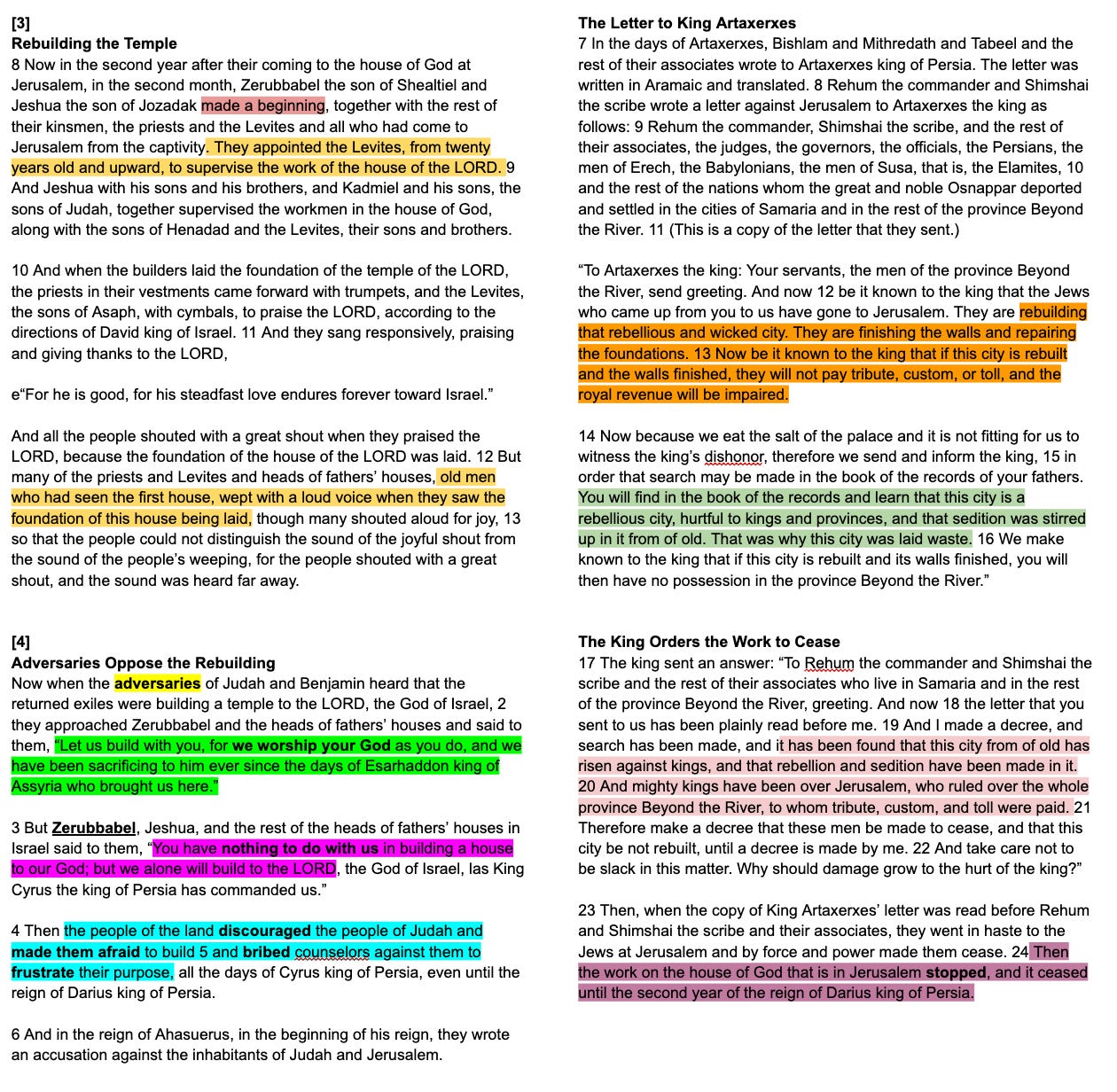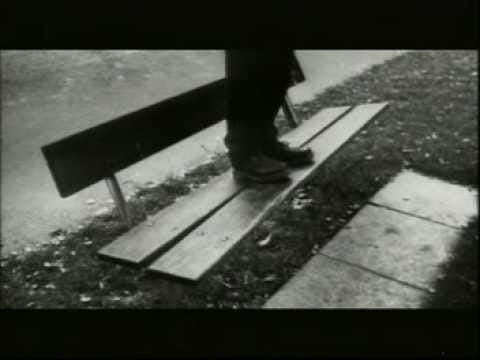Rebuilding the Temple
8 Now in the second year after their coming to the house of God at Jerusalem, in the second month, Zerubbabel the son of Shealtiel and Jeshua the son of Jozadak made a beginning, together with the rest of their kinsmen, the priests and the Levites and all who had come to Jerusalem from the captivity. They appointed the Levites, from twenty years old and upward, to supervise the work of the house of the LORD. 9 And Jeshua with his sons and his brothers, and Kadmiel and his sons, the sons of Judah, together supervised the workmen in the house of God, along with the sons of Henadad and the Levites, their sons and brothers.
10 And when the builders laid the foundation of the temple of the LORD, the priests in their vestments came forward with trumpets, and the Levites, the sons of Asaph, with cymbals, to praise the LORD, according to the directions of David king of Israel. 11 And they sang responsively, praising and giving thanks to the LORD,
“For he is good, for his steadfast love endures forever toward Israel.”
And all the people shouted with a great shout when they praised the LORD, because the foundation of the house of the LORD was laid. 12 But many of the priests and Levites and heads of fathers’ houses, old men who had seen the first house, wept with a loud voice when they saw the foundation of this house being laid, though many shouted aloud for joy, 13 so that the people could not distinguish the sound of the joyful shout from the sound of the people’s weeping, for the people shouted with a great shout, and the sound was heard far away.
Adversaries Oppose the Rebuilding
Now when the adversaries of Judah and Benjamin heard that the returned exiles were building a temple to the LORD, the God of Israel, 2 they approached Zerubbabel and the heads of fathers’ houses and said to them, “Let us build with you, for we worship your God as you do, and we have been sacrificing to him ever since the days of Esarhaddon king of Assyria who brought us here.”
3 But Zerubbabel, Jeshua, and the rest of the heads of fathers’ houses in Israel said to them, “You have nothing to do with us in building a house to our God; but we alone will build to the LORD, the God of Israel, las King Cyrus the king of Persia has commanded us.”
4 Then the people of the land discouraged the people of Judah and made them afraid to build 5 and bribed counselors against them to frustrate their purpose, all the days of Cyrus king of Persia, even until the reign of Darius king of Persia.
6 And in the reign of Ahasuerus, in the beginning of his reign, they wrote an accusation against the inhabitants of Judah and Jerusalem.
The Letter to King Artaxerxes
7 In the days of Artaxerxes, Bishlam and Mithredath and Tabeel and the rest of their associates wrote to Artaxerxes king of Persia. The letter was written in Aramaic and translated. 8 Rehum the commander and Shimshai the scribe wrote a letter against Jerusalem to Artaxerxes the king as follows: 9 Rehum the commander, Shimshai the scribe, and the rest of their associates, the judges, the governors, the officials, the Persians, the men of Erech, the Babylonians, the men of Susa, that is, the Elamites, 10 and the rest of the nations whom the great and noble Osnappar deported and settled in the cities of Samaria and in the rest of the province Beyond the River. 11 (This is a copy of the letter that they sent.)
“To Artaxerxes the king: Your servants, the men of the province Beyond the River, send greeting. And now 12 be it known to the king that the Jews who came up from you to us have gone to Jerusalem. They are rebuilding that rebellious and wicked city. They are finishing the walls and repairing the foundations. 13 Now be it known to the king that if this city is rebuilt and the walls finished, they will not pay tribute, custom, or toll, and the royal revenue will be impaired.
14 Now because we eat the salt of the palace and it is not fitting for us to witness the king’s dishonor, therefore we send and inform the king, 15 in order that search may be made in the book of the records of your fathers. You will find in the book of the records and learn that this city is a rebellious city, hurtful to kings and provinces, and that sedition was stirred up in it from of old. That was why this city was laid waste. 16 We make known to the king that if this city is rebuilt and its walls finished, you will then have no possession in the province Beyond the River.”
The King Orders the Work to Cease
17 The king sent an answer: “To Rehum the commander and Shimshai the scribe and the rest of their associates who live in Samaria and in the rest of the province Beyond the River, greeting. And now 18 the letter that you sent to us has been plainly read before me. 19 And I made a decree, and search has been made, and it has been found that this city from of old has risen against kings, and that rebellion and sedition have been made in it. 20 And mighty kings have been over Jerusalem, who ruled over the whole province Beyond the River, to whom tribute, custom, and toll were paid. 21 Therefore make a decree that these men be made to cease, and that this city be not rebuilt, until a decree is made by me. 22 And take care not to be slack in this matter. Why should damage grow to the hurt of the king?”
23 Then, when the copy of King Artaxerxes’ letter was read before Rehum and Shimshai the scribe and their associates, they went in haste to the Jews at Jerusalem and by force and power made them cease. 24 Then the work on the house of God that is in Jerusalem stopped, and it ceased until the second year of the reign of Darius king of Persia.
Ezra 4 - intro
Between the Trump assassination attempt and the Euros 2024 final - we have no small pool of conceptual reference for a cosmos in which conflict is played out, and yet, I rarely foreground this theological apprehension.
[1] Vision - God is doing a new thing.
God is starting a new thing, a second chance, a city rebuilt.
Who is building this Temple/City? What is it to do a thing? Singularity of purpose, purity, vision..
[2] Opposition - ways it is opposed
How was it stopped?
What stops us doing the thing?
Who is defining what we are against, what agency - merely to acknowledge there are two sides on the pitch
[3] Culpability / complicity - ways we oppose it
Are we the baddies?
How do we do it?
[1] Ezra Context / Intro
1.1 OT overall - salvation history prototype and realism
We should be a people marked by our well-callibrated grasp of the forces in play in the practical, spiritual, political, ecclesiological world we conduct our lives at home/work/play
Realism - Steeped in realism - fallen world, ideals, and enemies
No bed of roses,
This is the way things are, the recurring patterns, the long yearning for a sufficient saviour, casting towards the way things should be
Realism - Cautionary - ways in which We are the baddies - we are the older brother, the persecutor, the pharisee
Realism - God is in charge, promises are faithful
God influencing the arc of history,
Reset / second chances / it’s not over til its over
Over against decline - but as powerless people, we face the need to reform, away from idolatry
People fail, but god’s promises don’t fail
Not a text book, no easy answers.
Filter, not so simple as be-like-ezra,
Still the case - world fallen, we capable of mischief, God in charge, planning salvation
1.2 Pre-ezra and the run-up - Empire
Nebuchadnezzar into Babylon 586 BC ~ Daniel and co
70yrs exile
Cyrus the great - game changer in Babylon. Cyrus sending people bac variously - not just Israelites 559 - 530
Ez 1-6 - 536BC
Ez 7-10 - 458BC
Nehemiah 445-432 bc
1.3 Ezra 1-3 recap - Second chances
Chapter 1 - Prep
[1] In order to fulfil the word of God, Jeremiah prophesied a 70year exile, that time is up, now God is doing something new - you have to know God is in charge. Even though they didn’t see it, god had been doing something all along.
[2] These big cogs, beyond us. God has used these wider circumstances - both as the incidental context and the direct content, is using these.. Cyrus was a fill in the blanks guy
[3] Participate - we need to expect to materially support what he is doing in your life. If you are able go, otherwise support. Giving campaign, matched and lead - active support comes from leaders. God’s stuff
Chapter 2 - Assemble a team - SPJ
Priest would be good to have with you
Verifiable
Nehemiah - different numbers as some people dropped out
Intercessors - priests
Examples - levites
Worship leaders, lifters
Supporters - Temple servants - people who love you despite who you are
v64 etc
Some people aren’t qualified / Wrong people in leadership
Hard to go from patter of life from dark to light Vs “broken britain”
Takes an entire team
Chapter 3 - Steve
Doing this as one - 3v1
Do it by the book - national values 3v2
Altar Zerubbabel and Joshua
Daily sacrifice - faithful, biblical, literal
Do productivity and fecundity
When moving forward, enemy pays attention
Chapter 4 - Adversaries
As we then tip in chapter 4, we meet adversaries
What is your theology of enemies? i practically tend to live with a naive no-enemies approach, as if all friction is merely material affordances of the world of rust, entropy and incompletion. A theology of enemies feels an Alien notion to me - vs Peaceable toleration, there are no dynamics of competition, we live after the end of history, suspicious of the notion that there are enemies - that would seem to be the problematic. Culpably naive. Perpetual. Not after the end of history. Not that we need a post-911 renaissance of violence.
No enemies
[1] No enemies, only sub-par?
Good as the enemy of the best, Enemies including triviality
Mild mannered as the enemy of the actually redemptive
[2] No enemies: not doing something that is Ambitious and so precarious
Identify with city building being goal oriented
This notion seems clear-ish in marriage - - Ambitious project with a purity dimension, Exclusivism; Singularity of purpose; Thinghood, this and not that; Clarity of focus; Be very very what you are. Distinction, antitheses. Conscious that we we are doing is this and not that. The what-it-is-ness of what we are doing. Selectivity and exclusivity
Practical
Symbolic
What are we as we opposed in? vs The danger of being unserious
[3] No enemies: not doing something that requires nuanced and explicit cooperation
Generalised holiness, but also specific architecture, for a specific place. Denizens of a privatised christendom,
Who you worship
Who you Allie with
Boundary of our us-ness, what we bond ourselves to
Club that exists for the benefit of its non members
Friend / Enemy?
High and necessary view of forms of covenant friendship.
A realistic view that there are two sides on the pitch.
Drama, the sportsball - contest happens over there, conflict tension targets, ambition, doing the doing of a life over-against. Naive religiousness will save you. Naive that it is not urgent. Tin foil hat vs Screw tape
Enemies:
Identify it vs create it
Helpful agonism vs exacerbated antagonism
Dichotomy is necessary, To then subvert
What is the alternative? - naivete, a self-righteous pacifism, Laissez faire, nothing to live or die for, Broad morass of other others, Mere collectives, Columns in a generalised bureaucracy, Passionless, Managerialism, Synthetic silt of bland
Friends
What does the friendship of common cause involve?
Paying tribute and the relationship of the christian project to the state
Vested interests
Paul and the evil spirit cast out
Useful categories - Friendship enmity
Co-occuring in one person
Symbolic, not necessarily ad hominem
De facto, without needing to seek out or make enemies,
Conflict over finite resource
Implications
What can we cooperate in building and what not
Not unequally yoked
Not against us is for us
People of peace
Opsec wise as serpents
[2] Chapter 3-4 - Attacks
What would be attacked and how?
Derail it,
Disrupt the team
Diluted
Discouragement
Deception
Distraction
Disinformation
[1] Nostalgia
“..old men who had seen the first house, wept with a loud voice when they saw the foundation of this house being laid..”
Old guard vs a bunch of 20-somethings
3v8 20years old to supervise
3v12 old men who had seen the former house
Old guard weeping - disappointment / discouragement / nostalgia. Despising the day of small things (after this delay, in ez6, Darius decrees this is built to scale). Impatience and nostalgia. First attack was self-inflicted. They didn’t look in the faces of the young, they looked in the stones of the old - hearts dedicated to get in started. I think this is salient - I check out in melacholia.
Loud melancholy attracts the attention, blood in the water.
Herod in Matthew 2 - All of Jerusalem with him
Cinematic melodramatic - zoom out - like Ross “my sandwich”
[2] Deception
4v2 “Let us build with you, for we worship your God as you do, and we have been sacrificing to him ever since the days of Esarhaddon king of Assyria who brought us here.”
To the young untested leaders + The discouraged elders - they don’t care what we think..
the allure of scaling through compromised partnership - risk of a generalised project - stay small and precise
“You have nothing to do with us in building a house to our God; but we alone will build to the LORD”
[3] Discouragement / Distraction
V4 “..the people of the land discouraged the people of Judah..”
V4 - distraction, merepeem - relaxed them.. Mə-rap-pîm lackadaisicality
The role of courage and encouragement
[4] The use of fear
“..made them afraid to build..”
https://sacredtexting.substack.com/i/55191092/courage-for-sadness
What are you afraid of? Bluster boogie man
Types of Fear / Core Anxieties for those prone to general anxiety,
1) fear of abandonment
2) loss of identity
3) loss of meaning
4) loss of purpose
5) fear of death, including the fear of sickness and pain
The role of fear individually vs the role of fear as a collective
[5] Subsidy
“..and bribed counsellors against them to frustrate their purpose..”
The allocation of resources
The creation of incentives
[6] Speculation / deception
“..rebuilding that rebellious and wicked city. They are finishing the walls and repairing the foundations. 13 Now be it known to the king that if this city is rebuilt and the walls finished, they will not pay tribute, custom, or toll, and the royal revenue will be impaired..”
Projection (they won’t send tax revenue)
Selective view of history - true, but not the whole story
Whataboutism
[3] Are we the baddies & how I oppose the work of God
Locating dynamics of enmity
Locating motives, economic vested interests - Petty jealousies and threats
Intramural qualms, factions, shades of difference
[4] Post-script - opposing Jesus and the enneagram
For another time, but I would be interested to explore enneagramatic enemisation - that is, ways in which 9 temperamental archetypes loosely structured around 9 besetting sins, would give rise to specific enmities.
Dynamics of opposition - individually, but also corporately
Jealousy, fear, disgust - but that he represents an embarrassment of human potential, and casts into stark relief
9 Types
inconvenience of his truth telling and the purity of his black-and-whiting (1)
embarrassment of his superior help (2)
jealousy of his popular image (3)
the potency of his accurate melancholy dirge in the marketplace - like the suppression of Sadness in Inside Out (4)
the threat of his knowledge, his ability to out-think (5)
the resilient fortitude of his passionate loyalty (6)
the irreligious gregariousness of his wine (7)
qua spearhead of the kingdom, for turning over the tables, for calling out the hypocrisy. (8)
transgressive empathy (9)













Share this post